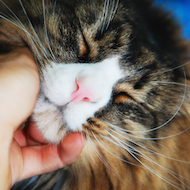Cats help owners 'purr away the blues'

Findings suggest that during January and February, cat owners experience 60 per cent fewer headaches than non-cat owners.
Our cats' ability to purr away our troubles will be cause for celebration at this year's London Wellbeing Festival, where Cats Protection will be promoting the health benefits of owning a cat.
It is widely accepted that pet ownership can have a positive effect on both physical and mental human health.
According to research carried out by health psychologist Dr June McNicholas, and commissioned by Cats Protection, our feline friends help us cope with many of the demands of everyday life.
Findings suggest that during January and February, cat owners experience 60 per cent fewer headaches than non-cat owners.
Just over a fifth of participants were found to be less likely to catch a cold or flu, and reported feeling significantly less miserable, impatient and tense than those without a feline companion.
Around half of the participants aged over 55 said their cat had helped them in a crisis, while 46 per cent said their pet helped them deal with bereavement.
Furthermore, over 80 per cent of children aged 13 and under said they would sometimes share their feelings with their cat rather than a friend or family member.
Emma Osbourne, Cats Protection's events manager, said: "Our research shows that cats can have a hugely positive impact in the lives of people they live with, whether they are young children, busy couples or pensioners.
"We know cats can provide endless entertainment with their antics, but it is also the companionship and the comfort they bring that has such a beneficial impact on their owner's physical, mental and emotional wellbeing."
During London Wellbeing Event, which takes place in Olympia from May 1-4, Cats Protection will be discussing the health benefits of cat ownership from their stand.



 The latest
The latest